Abstract: Formal and nonformal educators help develop the environmental literacy (EL) of K-12 students, but do so in very different contexts. This paper describes educators’ views of their roles in developing student environmental literacy and barriers to that work. Educators with more advanced EL mentioned practices such as perspective taking and information evaluation. Many educators highlighted developing a connection – between students and the environment or between curriculum and students’ lives – as key to their work. The barriers identified reflect previous research, with nonformal educators also identifying access to student and peoples’ access to their sites as a major barrier.
Continue ReadingAbstract: I was slow in coming to see the desperate need of sustainability education, in part because of a missed opportunity in my field of outdoor adventure education (OAE). Although a burgeoning set of scholars agree that OAE is strategically placed to educate for sustainability, little change within our discipline has occurred. To encourage the transition, this paper has four central aims. First, I contextualize the implications at stake by summarizing recent scientific predictions around climate change. Second, I differentiate sustainable OAE into the sustainability of OAE (e.g., its practices, footprint size, etc.) and OAE for sustainability (e.g., curricula that promotes education about sustainability), noting that despite long-standing petitions to address both, progress has been made in neither. Third, I celebrate, with others, the inherent potential that OAE has to promote sustainability through its educating in natural environs, within living/learning communities, which utilize physical/sensory, affective and intellectual ways of knowing that inspire critical impulses. Fourth, I outline the central changes that need to occur in order to create sustainable OAE. The foremost change needed is for OAE programs to curricularly commit to promoting a sustainability worldview, including values, knowledge, dispositions, and agency related to environmental, social, and economic justice. However, change of this depth will require a revision of OAE course offerings that allow for multiple and prolonged participant engagement over time. Such engagement, then, necessitates that OAE shift its emphasis from remote and sublime landscapes, to programs that not only connect participants to the places in which they reside, but cultivate a care and affection for them. This appreciation can be created through a combination of adventurous learning and microadventures. In sum, “local landscapes, far more often, as a way of life” encapsulate the changes OAE might make in contribution to the global need of sustainability.
Continue Reading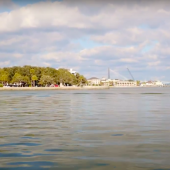
What if a river or a creek were to tell us its story? In this short film and interview, we offer a glimpse into the ecological philosophy guiding our efforts to create “more sustainable ways of living with water and how to appreciate its capacities to support all life.”
Continue ReadingAbstract. This study investigates whether children at an urban place-based environmental education camp can develop three dimensions of eco-character development after week-long participation: Head (knowledge), Hand/Feet (action), and Heart (care/connection). Using a community-based and inquiry-driven curriculum, campers practiced the roles of an arborist, ecologist, and environmental steward. Fifty-five Campers were assessed on all three dimensions using a 10-question pre/post-survey. An overall increase in content knowledge, relationships with nature, and motivation for pro-environmental behaviors were found. Outdoor environmental education summer camps and other out of school experiences may be the new avenue for educators and instructors to consider when trying to promote positive eco-character development in future generations.
Continue Reading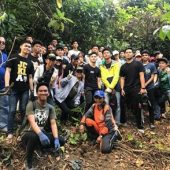
Universally, trees have been an important part of urban landscapes for millennia since they offer adequate benefits to humanity. Studies highlighted the positive impacts of biodiversity conservation in the students’ academic performance but there is still lack of literature pertaining to its role on the promotion of environmental education in the Philippines. On this note, this study aimed to analyze the Filipino senior high school students’ perceptions and experiences on participating in a tree planting activity, identify the implications of tree planting activity in studying Earth and Life Sciences, and explore the perceived constraints and opportunities. The study design is descriptive-qualitative in nature. Based on the qualitative data analysis, five themes have emerged such as: (1) simple yet beneficial; (2) opportunities and constraints; (3) practical application of learning; (4) environmental awareness promotion; and (5) mitigating environmental degradation. In conclusion, tree planting activity as a part of the field study program in schools is one of the most effective ways to combat and slow down the effect of global warming while promoting the students’ academic interests. This study also highlighted the positive impact of tree planting by improving the Filipino students’ perceptions of life, community, and environment which is the goal of 21st century education. Lastly, the study recommends the development of extension programs to school communities in the Philippines and worldwide that will arouse the interests and participations of the students to tree planting activity, gardening and ecological tours by partnering with relevant organizations and agencies.
Continue Reading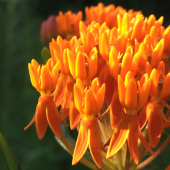
The relationship with nature and pro-environmental behaviors of community college students in introductory environmental biology courses were assessed using psychometric instruments and environmentally-themed Likert-based statements. Post-class, students demonstrated an increase in level of concern for non-human species and viewed themselves as closer to nature. Students’ motivation for environmental concern for other people or themselves was not affected by completion of the course. As a result of the class, students demonstrated increased levels of pro-environmental behavior, such as thinking about the environment, recycling, and energy and water conservation. Changes in relationship with nature and pro-environmental behavior were moderated by professor, suggesting that the professor’s teaching style and attitude may influence students’ views and attitudes. Neither gender, age, student status (full- or part-time), nor type of class (with lab or without lab) influenced students’ relationship with nature or pro-environmental behaviors. Substantially increasing the personal responsibility and degree of interaction with course content, as reflected by the comparison of an honors section to regular sections, did not result in significant changes in either relationship with nature or pro-environmental behavior. Applications to course instruction and environmental education at large are discussed.
Continue ReadingMovies as Mirrors is a conversation podcast in which guests discuss films that reflect a social issue that interests or affects them. On this episode, Professor of Humanities George Handley discusses the 2011 film “The Tree of Life” with podcast creator Benjamin Thevenin and guest-host Camlyn Giddins. The conversation explores the film’s representations of our relationship with the natural world, and in particular its use of eco-theology to introduce its audiences to ecological issues. We discuss the value of film as environmental education for the public and the need for more nuanced cinematic representations of issues like climate change.
Continue Reading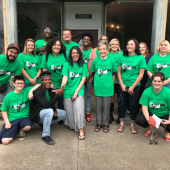
Abstract: In the summer of 2019, the We are All Connected urban-rural youth media program launched Something in Our Water, an eco-media documentary project that investigates the shared problem of water sustainability, public health, and climate change in their communities. This article discusses the transformative experience that the youth from New York City and the Clearfork Valley in the East Tennessee Appalachian mountains had as they learned about the history of multinational coal mine companies’ economic and environmental exploitation of the community, and the fierce and unequal power relations that continue to challenge environmental advocates today. With a focus on the perspectives of one of the Tennessee youth producers, the article reflects on the impact intergenerational learning and multicultural collaboration can have in nurturing future youth and community eco-media activists in Appalachia in the face of deeply rooted local and structural constraints. Through the process of documenting struggles in urban and rural communities, the youth team developed a deeper understanding of how the environmental justice movement cuts across differences to show how everyone is connected and can be empowered to take action.
Continue Reading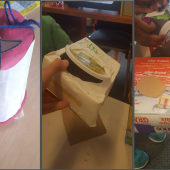
Abstract: This case study illustrates a cross-curricular learning experience, anchored in standards, where teachers and students actively engaged in co-constructed, inquiry-based learning and design thinking. The particular question this case study addressed was “How might students connect with environmental citizenship in authentic ways through media literacy experiences?” Specifically, the case study invited primary level learners to engage in a multimodal experience that was anchored in media literacy concepts and process. A pedagogical approach rooted in media literacy theory subsequently empowered students to make positive environmental changes in their communities and develop citizenship skills for the future. The project sought to develop awareness of sustainability through analysis, re-design, and production of snack food packaging. Educator reflections offer ideas for project improvement, such as producing for a wider audience, offering more choice, and making broader subject connections. This case study has implications for practice by demonstrating that, through various stages of scaffolding and integrated lesson design, young children are capable of applying sophisticated media literacy theory, inquiry, and design thinking to meet multiple curriculum standards.
Continue Reading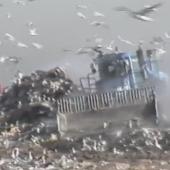
While teaching about climate change in K-12 schools often focuses on the catastrophic crises it is causing on a global scale, for students from poor and historically marginalized communities a pedagogy of environmental justice centers their own local neighborhoods, schools, and homes as sites for investigation and action. The Educational Video Center (EVC) in New York City has practiced this critical pedagogy for over 30 years developing students’ media literacy and civic engagement as they learn to question and bear witness to the toxic environmental conditions in their communities. Links to EVC student produced documentaries spanning three decades chronicle the impact of garbage landfills in the ground, sanitation truck fumes in the air, lead dust and black mold in the walls of their public housing apartments. Through these inquiries, students learn how such environmental pollution is linked to disproportionately high rates of lead poisoning and chronic asthma among low income communities of color. As a form of participatory action research, they not only learn to use the power of media to educate the public about the inequitable policies that produce these environmental and public health crises. They also use their videos to make a call to action for greater accountability and sustainable environmental justice.
Continue Reading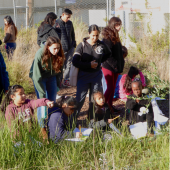
This essay explores the role of critical pedagogy in environmental justice education. We discuss the need for teaching a love of nature (biophilia) as an entry point for developing a caring relationship and sense of stewardship with the natural world. Place-based education and ecopedagogy offer liberatory potential to make education more transformative and focused on the intersections between social and environmental justice. After discussing theoretical approaches of ecopedagogy and indigenous perspectives, we describe a project in which a principal converts the hardscape at two schools into natural habitats and a new teacher engages her students in ecopedagogy.
Continue Reading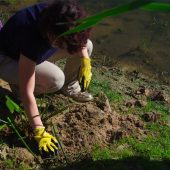
Anthropogenically-induced water quality issues are plaguing the people and environments of Southwest Florida. In 2018, nutrient-rich runoff into waterways caused one of the largest and longest occurring algal blooms in the area; however, many were unaware or misinformed about the causes or impacts of these blooms. Young people are at the forefront of this changing environment and will continue to face water reliance issues in the years to come (Leal, et al., 2015). However, gaps within the existing science curriculum do not address the anthropogenic actions that are leading to these crises (National Research Council, 2012). Southwest Florida is being drastically altered by the large number of people who move to the area each year; urban sprawl, habitat loss, and human-induced climate change are impacting the region (McVoy, et al. 2011). Local water quality issues necessitate a more focused, specific effort to build awareness and knowledge to ensure clean and safe water is locally available. Therefore, the need for Environmental Education (EE) is becoming increasingly important for students to be able to make informed decisions about personal actions contributing to these issues. The project, Future Leaders of Water Quality (FLOW) focused on educating teachers and students by engaging them in environmental literacy, specifically focused on water quality education in local middle schools. Project FLOW worked with local teachers to develop an innovative, five-day, lesson plan focused on the causes and implications of anthropogenically-induced eutrophic conditions. Data were collected throughout the implementation to measure the impact of the curriculum intervention that addressed water quality issues of the region. The results of the study suggest exposure to the lessons increased student understanding of water quality issues and motivated students to take personal action to improve water resiliency within their local communities.
Continue ReadingAbstract: Energy literacy, defined by the DOE, “is an understanding of nature and role of energy in the universe and in our lives” and, “…is also the ability to apply this understanding to answer questions and solve problems” (U.S. Department of Energy, 2013). Energy literacy is continuously evolving with the development of new feedstocks, technologies, and processes – all of which contribute to the changing landscape of energy production and use. In order for energy education to evolve with the energy field, better tools are needed to assess educational programs. The assessment discussed here is a step towards developing such an assessment for bioenergy.
Continue Reading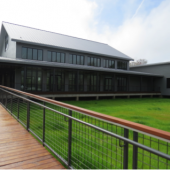
An Urban Nature Center: Take 2. My Journey to Sustainability Education in Rebuilding a Nature Center
Continue Reading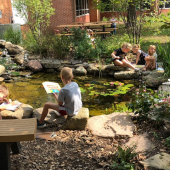
Though often considered an area of importance and emphasis, the enactment of Environmental Sustainability Education can vary considerably across schools and settings. This study used a narrative approach to tell the story of Environmental Sustainability Education at three schools within a 10-mile radius of our institution: a public charter school, a public school with a magnet STEM program, and a private Friends school. Our findings are discussed using the NAAEE’s Essential Underpinnings of Environmental Education, and shed light on possible future direction for pre- and in-service teacher education in Environmental Sustainability Education.
Continue Reading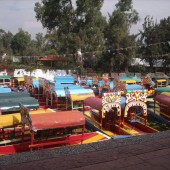
The educational experience described in this article was developed in the course “Social and Cultural Contexts of Teaching” for the Sociology of Education bachelor’s degree at the National Pedagogical University, Mexico. In this course, students are expected to develop favorable attitudes toward the environment. The student’s defined environmental problems made a diagnosis and elaborated a case study, to discuss concrete solutions in their community. The educational experience included several moments: framing, joint planning of individual and group activities, and development of the case study. The balance of the results of the course was favorable; the group learned to work cooperatively, mutual trust prevailed within the teams, group agreements were respected, the group goal was clearly defined, and a case study was delineated and developed.
Continue Reading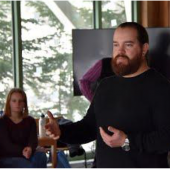
Ojibwe education is used at Conserve School, an environmental semester school, to help high school students better understand diverse perspectives on stewardship and to explore the history, cultures and place of the Northwoods of Wisconsin. In the Environmental Stewardship class, students learn about indigenous history, culture and environmental perspectives from a local Ojibwe forester. The students use this perspective to help them appreciate their place at Conserve School and explore their own environmental ethics. Students also participate in Ojibwe seasonal celebrations to better comprehend how place and people are interrelated.
Continue Reading
Faced with everything from climate change to resource depletion, citizens must be environmentally literate. One path to literacy is through teacher education. Participants in this U.S.-based study completed a survey, indicating teaching methods and assessment strategies used to address the Guidelines for the Preparation and Professional Development of Environmental Educators themes. Although many indicated unfamiliarity with the Preparation Guidelines, the majority address them in their teaching. Fostering Learning, Environmental Literacy, and Planning and Implementing Environmental Education were commonly addressed, while Foundations of Environmental Education was not frequently addressed. Discussion, inquiry-based learning, and assigned readings were often used teaching methods, while lesson plans and reflections were common assessments. The results suggest that faculty members are implicitly including EE and that there are gaps in meeting the competencies in EE.
Continue ReadingAbstract: India has compulsory teaching and learning of Environmental Education at all levels of formal education. This was mandated through a Supreme Court directive. This study was conducted using a survey instrument that was used as a proxy of sustainability literacy. The instrument had open-ended questions to gauge the respondent’s perspectives, close ended knowledge-based questions, statements to understand attitudes and their awareness of eco-labelling/certification. The target group of study was the entire batch of 90 students (15 Female and 75 Male) that had joined the postgraduate programme in 2014. The students came with about of year of work experience. The major background was engineering and science with only eight percent with commerce background. All were found to be high achievers in their previous education in school and graduation.
Content analysis of the open ended question showed that 24 percent of the students agreed that economic development at the cost of environment is a short term solution, followed by 16 percent each saying that there is a need to have a balance or economic development should be at the least environmental cost. About seven percent said that economic profit can improve the environment and there is no option left if we need economic development. Only six percent putting comfort over the environment. Although the attitude was very positive, about 62 percent of the students were not able to articulate the difference between the quality of life and standard of living. 75 percent of the respondents supported the compulsory CSR act. 71 percent were in favour of extended producer responsibility. There seems to be a limited understanding of sustainable development and equates it to environmental conservation as any lay person who is informed by mass media. 72 percent did not understand the term Green Washing. The awareness was found to be moderate. Profit maximisation was the understanding as the goal of a business. Nearly half of them were of the opinion that consumers will not pay for environmentally friendly products. Although a high of 89 percent said that eco-labelling has an influence on consumer behaviour, very few of them were aware of eco-labels. Almost all agreed that polluters should pay 67 percent of them also believe that environmental clearances are an impediment to economic growth and 64 percent believe that privatisation leads to better utilisation of resources.
The study shows a pro environment attitude but at the same time a limited understanding of the depth of issues and only the economic centric perspective of sustainable development. Only 16 percent gave some hint of social dimension to sustainable development. Awareness of HDI and GDP was high but connection to quality of life was missing. The environment was high on priority as 24 percent of the students agreed that economic development at the cost of environment is a short term solution, followed by 16 percent each saying that there is a need to have a balance or economic development should be at the least environmental cost. There seems to be a limited understanding of sustainable development and equates it to environmental conservation as any lay person who is informed by mass media.
Also it was found that students were influenced by common business perspective being projected in Indian media. Business is becoming a major driver of sustainable development with increasing production and consumption along with population as a major reason for environmental degradation. It is recommended that social and environment be part of ethical framework of business education. It would be useful if details sustainability literacy assessments are done to inform the business management curriculum for the need to include environmental /sustainability management. The impact of undergraduate discipline was found to influence awareness and perception and hence it is important that the management curriculum removes the gap in sustainability literacy amongst students.

Abstract: This study sought to determine the influence of environmentally themed higher education courses upon students’ self-perceptions of their environmental literacy. Past research has suggested mixed conclusions about the objectives, approaches, and impacts of environmental and sustainability education in higher education. This study assessed environmental literacy and the influence of pedagogical perspective and instructor emphasis in environmentally themed higher education courses. Using the Hollweg et al. (2011) framework for environmental literacy, the study assessed students’ self-perceptions of their environmental literacy in a pre- and post-test format. Data were analyzed using a paired samples t-test and one-way ANOVA with a Tukey HSD post-hoc test. The results of the study showed that environmentally themed higher education courses are having a significant influence on students’ self-perceptions of their environmental literacy. However, instructors seemed to emphasize behavior least of the four aspects of environmental literacy. These findings suggest that environmentally themed courses are having a strong impact, yet further integration of environmental education principles may be meaningful. This study clarifies the impact of environmentally themed higher education courses. The distinction between pedagogical perspectives delineates new understandings of the differences in environmental literacy change. This study serves as a ground for future research to build the implementation of environmental education in higher education.
Continue Reading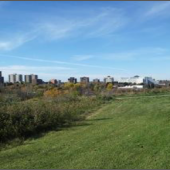
This paper provides a descriptive analysis of the experience of four doctoral students engaged in a collective project of place exploration at a midsize Canadian university. Under the methodological tradition of self-study, we contextualize concepts of place attachment and decolonization in order to investigate what it means to be interdisciplinary scholars of sustainability. We use storytelling and mobile discussion methods, alongside visual and mapping methods to disentangle our experiences and analyses of place, mobility, land, and scholarship. This reflective piece demonstrates that collaborative forms of scholarship such as this require deliberate moves toward community creation and place attachment within institutions of higher education. Through a process of collaborative investigation and writing, we have created spaces of caring academic scholarship rather than engaging in competitive and hierarchical university culture.
Continue Reading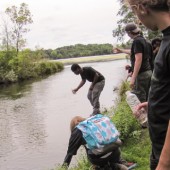
This case study describes an art-led environmental education project at an environmental charter high school in Minnesota. The project is a pilot of the model called Earth Systems Journey, and the theoretical approach of this model is summarized. Its goal is to provide experiential integration: a sense of self and place that are integrated with each other. The case study project, called “River Journey: Exploring the Value of the Mississippi River,” took place in the 2014-2015 school year with students in grades 9-12. River Journey takes students on a journey of their place in the local water cycle to discover how the water that flows through their school’s kitchen sink is interconnected, both upstream and downstream, to the Mississippi River through water and wastewater treatment and distribution infrastructure. Students create a GIS story map as a way to reflect on and integrate their learning and as a public educational resource. The idea of river exploration expands throughout the curriculum in the second half of the year, and another set of GIS story maps explore the river from the perspective of personal stories, population-water resource tensions, water as a strategic element in the Civil War, and ecological issues that occur along the length of the Mississippi River. Art and story inform the design of the journey and its dramatic props, including GIS, used throughout the experience.
Continue Reading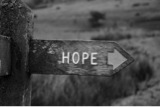
Abstract: The concept of hope is rich in context, and working with it from different angles can enhance inner resources. Framing hope as a process offers tools for sustainability educators: subjective exploration, empathy development, critical thinking, and civic engagement.
Continue Reading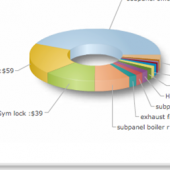
This paper will explore the Energy for ME program, funded by the Environmental Protection Agency and the National Science Foundation, which worked across formal and informal K-12 environments to bridge the gap between society, science, and the environment. Specifically, this article documents how Energy for ME integrates three experiential education pedagogies (place-based education, inquiry, and project-based learning) in combination with real-world electricity data in order to impact energy consumption within participating communities. Energy for ME schools and communities have saved over $135,000 in homeowner electricity costs, 900,000 lbs of carbon, and 1,000,000 kWh of energy) in electricity costs over the 3 years of the project.
Continue Reading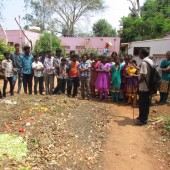
India is challenged by the nexus of environmental degradation and economic growth amidst the paradoxical coexistence of poverty and affluence in their multifarious dimensions. These challenges are directly linked with the conservation and maintenance of the life supporting systems such as land, water, air, and biological diversity. The major causes of environmental degradation are population growth, industrialisation, changes in consumption patterns, and poverty threatening the dynamic equilibrium that could exist between people and ecosystems. In an effort to address these issues, environmental education for sustainable development (EESD) is emerging as an important approach to encourage students to conserve and protect the natural environment in their schools and in their neighbourhoods.
Continue Reading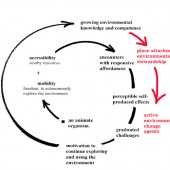
Learning in the outdoors has significant educational advantages for children in the Primary School years and the need to connect with nature is becoming increasingly prominent in research worldwide. Pro-environmental behaviour, especially in the early years, has been shown to have a causal relationship with connectivity with the natural environment. Place-based outdoor learning promotes a relationship with the natural environment and constructs deep environmental knowledge and understanding of the world that surrounds learners. Embedding Indigenous culture and knowledge into outdoor learning within Primary School programs enables local knowledge and understanding to permeate throughout activities in explicit and experiential ways. A place-based pedagogy recognises the importance of forming intimate relationships with place through regular visitations to the same outdoor environment. One of the many global challenges confronting teachers working in Primary schools is how to implement holistic learning into their educational programs. This paper explores how an Australian case study utilises place-based outdoor learning and environmental sustainability within the school curriculum.
Continue Reading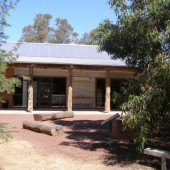
Place-based education is education that is “grounded in the resources, issues, and values of the local community and focuses on using the local community as an integrating context for learning at all levels” (Powers, 2004, p. 17). The purpose for becoming conscious of places in education is to extend “notions of pedagogy and accountability outward, toward places” making learning more relevant to “the lived experiences of students and teachers… so that places matter to educators, students and citizens in tangible ways” (Gruenewald, 2003, p. 620). Although place-based education is interchangeable with a number of terms – community based learning, rural education, project-based learning, service learning, and sustainability education – it encompasses a broad hope by educators to connect student learning to their community and the community to participate in the school (Powers, 2004). Situated within this partnership between school and community fostered through place-based education is the opportunity for rural-regional sustainability. In particular, the case study showcases how a school and community in rural south-east Australia have regenerated a degraded community stock-reserve to ‘tear down’ the school walls (fences) and perform place through the (co)creation of the Flatlands Nature Reserve as a place of protection, regeneration and environmentally sustainable practices. Furthermore, the story of the Flatlands Nature Reserve shows that “place is not only local, specific and static” but can be seen as a ‘revitalizing of the commons’ (Bowers, 2005) which has co-created a place of bio-diversity, regeneration and sustainability education that has fostered rural-regional sustainability.
Continue Reading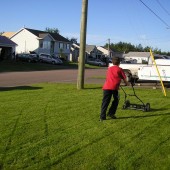
A case-study methodology was used to explore the processes of change as experienced by 18 New Brunswick (Canada) families attempting to lead a more eco-sustainable lifestyle as part of a 6 month long provincial initiative called the NB Family Eco-Challenge. Cross-case thematic analysis of findings revealed the emergence of certain conceptual themes related to families who successfully adopted collective environmental actions. For instance, we note the presence of certain applied competencies in these families, such as a capacity for planning, openness to change and collective efficacy. We also noted that families who succeeded in integrating collective environmental actions shared biospheric values and tended to maintain their chosen actions when part of a support network. Based on these findings, this article concludes by outlining the lessons learned in terms of their potential for a possible educational program for families looking to adopt a more eco-sustainable lifestyle.
Continue Reading
Environmental education (EE) strives to strengthen the ecological literacy of individuals and society. Guiding individuals along their own journey toward a deeper ecological literacy should be a central tenet of any EE program, and at least a complementary piece of programs in other closely related fields like experiential and adventure education, sustainability education, ecotourism, the natural sciences, conservation biology, public lands advocacy, wilderness-based therapy, ecopsychology and human rights and social justice. Regardless of their background, expertise, or actual job title, environmental educators should consider themselves key players in guiding individuals along their personal journey towards a deeper ecological literacy.
Continue Reading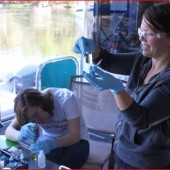
This paper presents a case study of an experiential learning project, an analysis of its transformative learning effects, and a description of the aspects most influential on transformative learning. The project is an eight-day houseboat excursion with students at the University of North Florida. Student work products were evaluated for evidence for transformative learning. The most powerful factors causing transformative learning were the experiential aspect of studying in the field, projects done strictly within a student’s major discipline, and extra-disciplinary projects done intentionally outside a student’s major discipline.
Continue Reading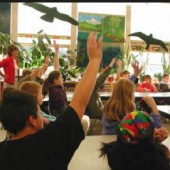
Even less well known than how non-formal education is woven into formal education is how classroom teachers and non-formal educators work together to plan and implement these kinds of partnerships in the classroom. This study sought to explore how to intentionally and effectively structure the partnership between a formal and non-formal educator. The results of the study indicated that formal and non-formal educators can support each other’s goals through systematic collaboration in a robust and dynamic partnership that necessitates working together both prior to and during the implementation of programs to define goals and iteratively gauge roles of each educator in the process. Suggestions are made for how both educators can be made aware of the commitment involved in an explicit collaboration, including materials needed, expected levels of communication, individual roles, assessment aims, and time needed for effective outcomes.
Continue Reading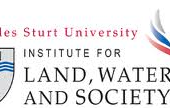
PDF: Rafferty and Laird, Spring 2013 Abstract: This paper explores the observations and perceptions of school children as they engage with nature through place based environmental experiences. The paper reports on two projects, one based in the USA and the other in Australia, designed to promote understanding of sustainability through outdoor […]
Continue Reading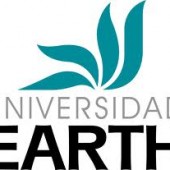
The purpose of this paper is to propose environmental education and eco-literacy as components of education for sustainable development through the examination of an eco-literacy program offered by EARTH University in Costa Rica to rural community public schools. To illustrate these components we examine the development of a program/curriculum used in 17 elementary schools. We draw two important conclusions from our examination. First we found that external national political, social, and economic forces were important to the program’s success. Secondly we illustrate the importance of developing and programs that address the specific needs and issues of the local region.
Continue Reading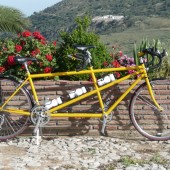
How can curriculum at the post secondary level be used to initiate discussion and reflection for students about current environmental issues and their personal relationship with the natural environment? This is explored through student observations and analysis of personal vehicle use over a four day period. The purpose of the analysis was to engage students in understanding both their personal relationship with and modern societies’ relationship with the private vehicle and the implications of this relationship on the natural environment. The data in this study are from 24 student journals documenting their vehicle use in two winter semesters (2006 and 2007). The results from the journals show five emergent themes relevant to personal vehicle use; time, convenience, freedom, cost and the environment. Within these themes student observations included insights into the challenges associated with changing human behavior towards the natural environment at a local and global level. This paper contributes to the larger discussion about curriculum that engages students in transformative education.
Continue Reading
In Learning Gardens and Sustainability Education: Bringing Life to Schools and Schools to Life, Williams and Brown (2011) place living soil at the center of the discourse on sustainability education. One of the seven principles that guides their pedagogy of learning gardens is: valuing biocultural diversity. This photo-essay of elementary students in K-8 schools, explores how 4 inches of soil in the learning gardens can teach about life’s diversity. The author urges humble attentiveness to that which is below our feet seemingly hidden and unnoticed yet teeming with life.
Continue Reading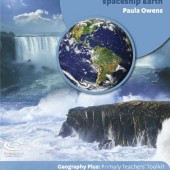
In this succinct and informative review, Shelby Gull Laird provides a good overview and solid recommendation for the comprehensive package of sustainability education K-12 curricular materials about geography—from a local to a global level—available from the UK Geography Association.
Continue Reading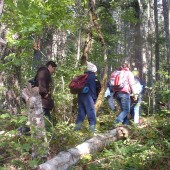
Two northwest naturalists offer a critical perspective on sustainability education by suggesting that, in order to inspire people enough to make changes in their perceptions and behaviors, sustainability education must embrace the central role of acquiring ecological knowledge through direct and shared experience in the natural world.
Continue ReadingAbstract This study examined adults’ feelings towards the environment in relation to recalled memories of childhood play. Today’s adults often associate scouting, summer camps, or playing in a creek with environmental education, with positive affect. Tomorrow’s adults won’t have this experience base. Environmental education and outdoor play have become too formalized for children to benefit […]
Continue Reading